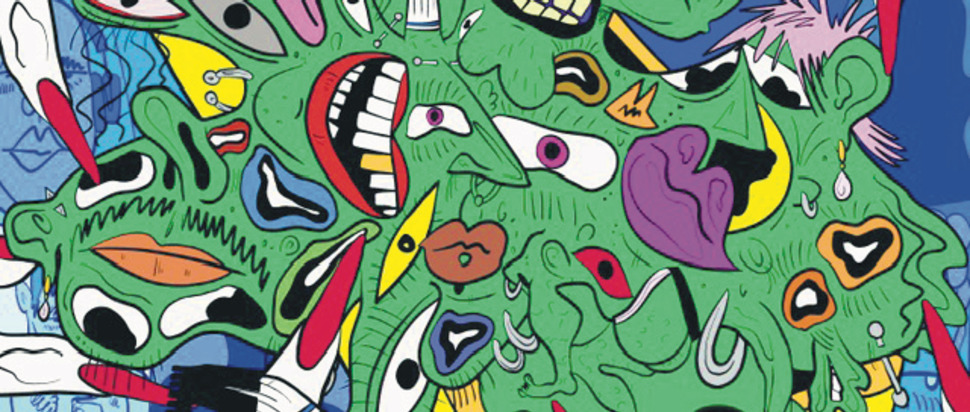Swipe-Date-Delete-Download: On Dating App Burnout
You're done with dating apps? Join the club. We explore dating app burnout in the queer community and all the complexities that come with our digital romances
My face has probably appeared on every queer single person’s phone in Edinburgh. I go through a swipe-date-delete-download cycle on dating apps. I’ve dated traditionally, meeting people at bars or in queer spaces – but these don’t seem to be the place to meet people anymore. Why is it still so hard to find someone with the almost unlimited connections dating apps promise us?
Dating app burnout is a sense of exhaustion from online dating. It’s becoming more prevalent – unsurprisingly, the pandemic saw us all flock to Hinge. For queer communities, it can be particularly complex. So many of us came into our queer identities online and now we’re so burnt out we desperately want to get offline. Dating while navigating queer politics can be a minefield.
Caitlin, 26, tells me about what she calls “compassion fatigue” – when you have swiped so much that “people blur into this one disgusting blob, and I don’t end up wanting to date anyone… you stop seeing people as people, it’s kind of just like Pokémon.” Many who report dating app burnout echo similar sentiments. It’s the gamification of dating: bright lights and swipes encourage us to dehumanise people. But the same could be said for meeting people in person. It’s clichéd but bars seem to house rotating characters too – twink, masc, drag queen. We’re playing out the apps in real life and becoming increasingly disappointed when people are not as curated as online profiles.
It’s unsurprising that queer people are turning away from dating apps. From the infamous Grindr bio ‘no fats, no femmes, no Asians’, to a lack of clarity in relation to monogamy. Perhaps the problem is that we’re using apps created for straight people, and those made specifically for us are underfunded and poorly designed. Until recently, non-binary people were classed as ‘men’ on Bumble and couldn’t message a woman first.
But many are apprehensive about dating IRL. “You don’t know who’s walking through that door,” says Phoebe, 22. “With the fear of spiking, bars come with an extra risk, but with the apps you can get to know the person a bit better before you meet.” Dating apps, in Scotland especially, have become a sort of queer directory. You meet people in ‘real life’ for the first time; but you’ve already seen them on the apps, and therefore know that they’re queer. This can be great for safety and security, but the spontaneity of meeting someone new for the first time is lost.
Twinam, 21, tells me why they like dating apps. “It takes a lot of pressure off meeting someone in real life,” they say, echoing Phoebe. “People are far less likely to try and go up to someone because there’s another option. I don’t know if that’s a bad thing or not but I do think that [online dating] loses something.” They also describe fears experienced by many masculine presenting lesbians and trans people. “I have worries about being perceived as predatory, which is a shitty internalised homophobia thing, but it’s a thing nonetheless.” Do dating apps make us feel safer? It’s easy to cry burnout but, for many in the queer community, they’re crucial – our Hinge boredom can take the back seat.
Dating apps give us power to be selective. There are countless apps tailored to sexuality or kink. You can filter by age, height, and even star sign. But this time-saving selection can close us off to potential matches. Of course we’re feeling burnt out if we’re meeting the same algorithm-selected people again and again. Regardless, it’s easy to feel fatigued when searching for your perfect match – a seemingly impossible task.
There’s hardly any intergenerational communication in the queer community. Perhaps because AIDS wiped out so many, or because nowadays we Gen Z & Millennials are online, with our blinders on. We’re so focused on prioritising dating that friendship has fallen off the radar, which could be contributing to the burnout. On the upside, the burnout we’re experiencing could present us with an opportunity to foster intergenerational connections. And, certainly, we’re stronger if we’re all in dialogue with each other.
Recently there’s been a rise in queer communities centred around a certain hobby. Kafe Kweer in Edinburgh holds events including life drawing and zine-making workshops. However, spaces such as these don’t have the same leaning towards dating. Maybe now friendship and community can take priority, instead of dating. Perhaps dating app burnout isn’t the worst thing ever; we can use it to make room for something else.
Everyone I spoke to has had relationships with people they met online, and yet are now seeking more traditional methods. How do we cope in an age so overwhelmed with connection? Keep connecting but connecting however feels good – online, or off.
